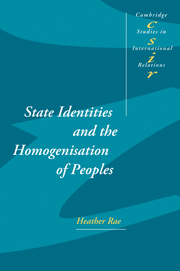Book contents
- Frontmatter
- Contents
- Preface
- Introduction
- 1 State formation and pathological homogenisation
- 2 The ‘other’ within Christian Europe: state-building in early modern Spain
- 3 State-building in early modern France: Louis XIV and the Huguenots
- 4 Pathological homogenisation and Turkish state-building: the Armenian genocide of 1915–1916
- 5 ‘Ethnic cleansing’ and the breakup of Yugoslavia
- 6 Evolving international norms
- 7 On the threshold: the Czech Republic and Macedonia
- Conclusion
- Bibliography
- Index
- CAMBRIDGE STUDIES IN INTERNATIONAL RELATIONS
7 - On the threshold: the Czech Republic and Macedonia
Published online by Cambridge University Press: 22 September 2009
- Frontmatter
- Contents
- Preface
- Introduction
- 1 State formation and pathological homogenisation
- 2 The ‘other’ within Christian Europe: state-building in early modern Spain
- 3 State-building in early modern France: Louis XIV and the Huguenots
- 4 Pathological homogenisation and Turkish state-building: the Armenian genocide of 1915–1916
- 5 ‘Ethnic cleansing’ and the breakup of Yugoslavia
- 6 Evolving international norms
- 7 On the threshold: the Czech Republic and Macedonia
- Conclusion
- Bibliography
- Index
- CAMBRIDGE STUDIES IN INTERNATIONAL RELATIONS
Summary
In chapters 2 to 5 I traced the relationship between state-building and the strategies of pathological homogenisation used by elites in their efforts to construct political communities within the boundaries of states according to exclusive criteria of identity and difference. In chapter 6 I showed how these practices, although bound up with the development of the international system with its norm of non-intervention, have also pushed the development of international norms of legitimate state behaviour that clearly proscribe such acts. If such practices have been a recurrent feature of modern international politics, what are the chances that the now well-established norms of legitimate statehood will stop new state-builders from employing similar tactics? Under what conditions are state-builders less likely to take this path? These questions are particularly salient when practices such as ethnic cleansing and the forced displacement of peoples – let alone the genocide in Rwanda – seem so prevalent in the post-Cold War world.
In this chapter I investigate the relationship between corporate and social identity construction in the formative stages of two post-communist states. Both of these states, the Czech Republic and the Former Yugoslav Republic of Macedonia (FYROM), are newly constituted following the dissolution of Czechoslovakia and the former Yugoslavia, respectively. Why choose these two states? First, their chances of a successful transition to democracy and the protection of human and minority rights seem very different.
- Type
- Chapter
- Information
- State Identities and the Homogenisation of Peoples , pp. 249 - 297Publisher: Cambridge University PressPrint publication year: 2002



